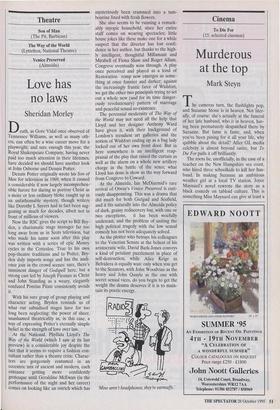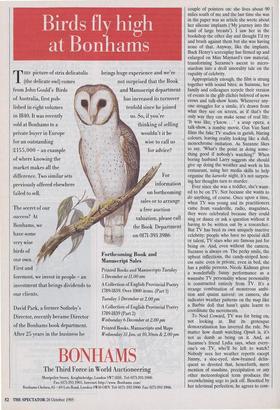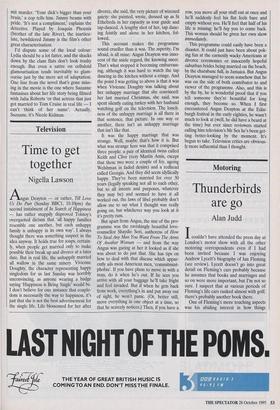Cinema
To Die For (15, selected cinemas)
Murderous at the top
Mark Steyn
The cameras turn, the flashlights pop, and Suzanne Stone is in heaven. Not liter- ally, of course: she's actually at the funeral of her late husband, who is in heaven, hav- ing been prematurely despatched there by Suzanne. But fame is fame, and, when you've been pining for it all your life, why quibble about the detail? After OJ, media celebrity is almost beyond satire, but To Die For pulls it off brilliantly.
The roots lie, unofficially, in the case of a teacher on the New Hampshire sea coast, who hired three schoolkids to kill her hus- band. In making Suzanne an ambitious weather girl at a local TV station, Joyce Maynard's novel rewrote the story as a black comedy on tabloid culture. This is something Miss Maynard can give at least a couple of pointers on: she lives about 90 miles south of me and the last time she was in the paper was an article she wrote about her silicone implants (`My journey into the land of large breasts'). I saw her in the bookshop the other day and thought I'd try and brush against them but she was having none of that. Anyway, like the implants, Buck Henry's screenplay has firmed up and enlarged on Miss Maynard's raw material, transforming Suzanne's ascent to micro- stardom into a droll amorality tale on the vapidity of celebrity.
Appropriately enough, the film is strung together with sound bites, as Suzanne, her family and colleagues recycle their version of events in the glib clichés beloved of news crews and talk-show hosts. Whenever any- one struggles for a simile, it's drawn from what they see on screen, as if that's the only way they can make sense of real life: `It was like, y'know. ' a soap opera, a talk-show, a zombie movie. Gus Van Sant films the fake TV studios in garish, blaring , colours, leaving reality looking like a dull, monochrome imitation. As Suzanne likes to say, 'What's the point in doing some- thing good if nobody's watching?' When boring husband Larry suggests she should give up doing the weather and work in his restaurant, using her media skills to help organise the karaoke night, it's not surpris- ing her thoughts turn to murder.
Ever since she was a toddler, she's want- ed to be on TV. Not because she wants to do anything, of course. Once upon a time, when TV was young and its practitioners came from vaudeville, radio, magazines, they were celebrated because they could sing or dance or ask a question without it having to be written out by a researcher. But TV has bred its own uniquely inactive celebrity: people who have no special skill or talent, TV stars who are famous just for being on. And, even without the camera, Suzanne is always on. The perky smile, the upbeat inflections, the candy-striped host- ess suits: even in private, even in bed, she has a public persona. Nicole Kidman gives a wonderfully funny performance as a wannabe TV personality whose personality is constructed entirely from TV. It's a strange combination of monstrous ambi- tion and quaint naiveté: on camera, she indicates weather patterns on the map like a Barbie doll that hasn't quite learnt to coordinate the movements.
To Noel Coward, TV was for being on, not looking at. But its grotesque democratisation has inverted the rule. No matter how dumb watching Oprah is, it's not as dumb as being on it. And, as Suzanne's friend Lydia says, when every- one's on TV, who'll be left to watch? Nobody sees her weather reports except Jimmy, a sloe-eyed, slow-brained delin- quent so devoted that, henceforth, mere mention of sunshine, precipitation or any other meteorological term produces the overwhelming urge to jack off. Besotted by her televisual perfection, he agrees to corn- mit murder. 'Your dick's bigger than your brain,' a cop tells him. Jimmy beams with pride. 'It's not a compliment,' explains the detective. Played by Joaquin Phoenix (brother of the late River), the inarticu- late, bewildered Jimmy is the film's other great characterisation.
I'd dispute some of the local colour: Lydia should be a lot fatter, and the shacks down by the clam flats don't look trashy enough. But even a satire on celluloid glamourisation tends inevitably to glam- ourise just by the mere act of adaptation. One line from the novel that's gone miss- ing in the movie is the one where Suzanne fantasises about her life story being filmed with Julia Roberts 'or that actress that just got married to Tom Cruise in real life — can't think of her name'. Actually, Suzanne, it's Nicole Kidman.




































































 Previous page
Previous page